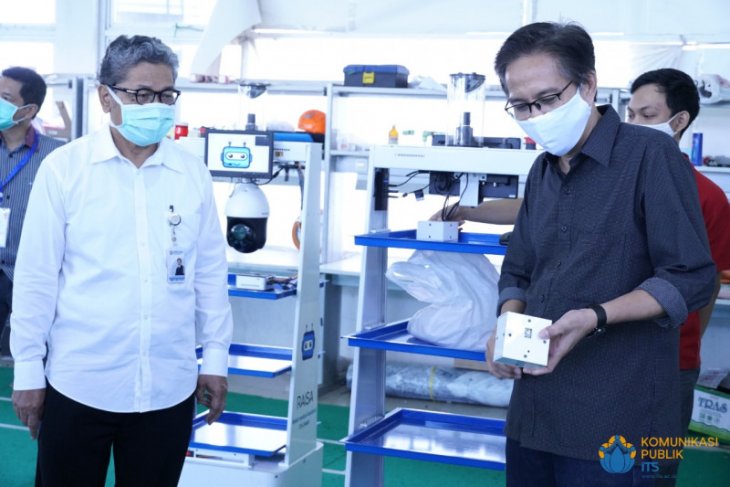Live Streaming
Program Highlight
Company Profile
RAISA Assists Medical Personnel in COVID-19 Treatment
Written by Ani Hasanah Director of Airlangga University Hospital Prof. Nasronudin (left) and Rector of ITS Prof Mochamad Ashari at the launch of RAISA at the ITS campus in Surabaya, East Java, on May 8, 2020. ANTARA
Director of Airlangga University Hospital Prof. Nasronudin (left) and Rector of ITS Prof Mochamad Ashari at the launch of RAISA at the ITS campus in Surabaya, East Java, on May 8, 2020. ANTARA
Research and Technology Minister Bambang P. S. Brodjonegoro lauded the development of a medical assistant robot named RAISA to aid medical workers in treating COVID-19 patients and minimizing contact with sufferers to reduce disease transmission.
RAISA, which stands for Robot Medical Assistant ITS-Airlangga, was developed as a result of the efforts of a joint team from the November 10 Institute of Technology (ITS) and Airlangga University, involved in the Consortium COVID-19 established by the Research and Technology Ministry/National Research and Innovation Agency.
"I praise the work, not only the initiator but also those involved in the development and the users. It seems that it will become a standard to be followed in the treatment of COVID-19 patients, with limited number of medical workers. The robot is expected to become a complement for medical workers," Bambang stated during an online seminar in Jakarta on Thursday.
The 1.5-meter-tall RAISA is operated with a joystick remote control and is equipped with four trays to carry up to 50 kilograms.
The Wi-Fi controlled robot has a 0.85 kWh battery that can operate for up to eight to 10 hours. It can be used to treat patients in the intensive care unit (ICU) and high care unit (HCU), including for unconscious patients.
ITS Rector Prof. Mochamad Ashari expounded that RAISA was developed to help medical workers and reduce the potential of COVID-19 transmission through direct interaction with patients.
RAISA was initially developed to facilitate the treatment of patients in isolation by providing services, such as carrying food, clothing, and medicines.
Furthermore, the robot was developed to monitor the patients' condition, such as checking their pulse, body temperature, and oxygen saturation level.
The robot has a built-in high-resolution camera capable of swiveling 360 degrees to effectually and directly monitor the condition of COVID-19 patients.
Currently, the robot has been used and operated at the Airlangga University Hospital (RSUA).
RSUA Director Prof. Nasronudin explained that the robot will help the hospital to treat and monitor patients, but it would not replace human medical workers.
"This robot is useful to protect medical workers and reduce patients' mortality and morbidity," he added. (ANTARA)



